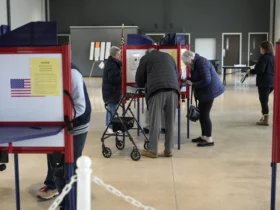The Conservative opposition in Canada demanded Liberal Prime Minister Mark Carney fire a Toronto-area candidate, Paul Chiang, for suggesting that an anti-Communist Conservative named Joe Tay should be handed over to the brutal Chinese government in exchange for a bounty on dissidents.
Tay is an immigrant from Hong Kong who has been critical of the Beijing-controlled puppet government on the island. Under the authoritarian “national security law” imposed by China to crush the Hong Kong democracy movement in 2020, criticizing the government is an illegal act of “sedition.”
“If anyone here can take [Tay] to the Chinese Consulate General in Toronto, you can get the million-dollar reward,” Chiang told a Chinese-language press conference in January.
Tay was running against Chiang in the district of Markham-Unionville at the time but is now the candidate for a different district. Chiang has been a Member of Parliament (MP) from Markham-Unionville since 2021. The bounty offered by the Chinese Communist Party for dissidents was $1 million in Hong Kong dollars, which works out to about $184,000 Canadian.
The demand for Carney to dismiss Chiang came from Conservative Michael Chong, who has been targeted by Chinese election interference for his own criticism of the Communist regime. Chong is currently a candidate for the Conservative Party for Wellington-Halton Hills North and has previously testified before the U.S. Congress about his own political persecution, noting that Chinese meddling in Canadian politics is a serious problem.
A Canadian intelligence commission concluded in April 2024 that China “clandestinely and deceptively interfered in both the 2019 and 2021 elections” – both of which were won by the Liberal Party. Liberal Prime Minister Justin Trudeau was heavily criticized for ignoring these warnings.
On March 30, Chong wrote on his X account that “[a]t least three Canadians have been coerced against their will to return to the People’s Republic of China,” indicating that the bounty touted by Chiang is no joke. Chinese expatriates living in Canada, and other countries, have good reason to fear the long arm of transnational repression from Beijing, especially if they still have families in China.
“Paul Chiang’s support for the CCP’s (Chinese Communist Party’s) illegal and unjust bounty on a Canadian citizen is shocking, particularly to the countless Canadians of Chinese descent who have been targeted and harassed by the Communist regime,” Chong said in a press release on March 29.
“After the lost Liberal decade of turning a blind eye to foreign interference by the CCP, warnings from experts, and a public inquiry, the Liberals continue to tolerate foreign interference putting the security of Canadians at risk,” his statement read.
“Mark Carney’s silence on his candidate creates the dangerous impression that he condones this despicable suggestion,” Chong charged.
On March 30, Joe Tay seconded the call for Carney to sack Chiang by releasing his own statement.
Tay’s press release read in part:
His threatening public comments were intended to intimidate me, and they must not be tolerated.
Further, he made an unsolicited attempt last night to contact me to discuss this matter, and has posted on social media that he offered me an apology.
I want to be clear: no apology is sufficient. Threats like these are the tradecraft of the Chinese Communist Party to interfere in Canada. And they are not just aimed at me – they are intended to send a chilling signal to the entire community, in order to force compliance to Beijing’s political goals.
This situation has left me fearing for my safety. Even prior to Mr. Chiang’s insidious comments coming to light, I had been in touch with the Royal Canadian Mounted Police regarding my personal protection.
In response, Chiang shared a statement to social media on March 31 in which he admitted that his comments in January urging anyone to turn Tay in to the CCP for a bounty were “deplorable and a complete lapse of judgment on the seriousness of the matter.”
Not all of the criticism for Chiang came from Conservatives. MP Jenny Kwan of the left-wing New Democratic Party (NDP), who has herself been targeted by China, asked on March 30: “In what universe is this normal?”
On March 31, Carney admitted that Chiang’s actions were “deeply offensive” and “a terrible lapse of judgment” – but refused to dismiss him. “He will continue with his candidacy, going forward, having made those apologies very clearly to the individual, to the community and moving forward to serve.”
Continuing, the Liberal prime minister hailed Chiang as a “person of integrity.” Carney did, however, take the precaution of not appearing in public with Chiang, who ostensibly had “other responsibilities” on that particular morning.
Conservative Party leader and prime minister candidate Pierre Poilievre said on March 31 that the scandal had blown up from questions about Chiang into a serious indictment of Carney’s judgement. “This is not about an inappropriate or off-color joke. These comments by this Liberal candidate may well rise to the level of criminal because they called for someone to be turned over to a hostile foreign government on a bounty.”
Also on March 31, UK-based human rights group Hong Kong Watch wrote a letter to Royal Canadian Mounted Police Commissioner Michael Duheme urging him to launch an investigation of Chiang.
“It is without question that Mr. Chiang’s comments are an attempt to intimidate Mr. Tay and his supporters and to silence him during an election. It is without question there are implicit threats of violence and an illegitimate reward in the form of a bounty,” the organization stated. “Canada must send a strong signal that these threats are not acceptable, and that means enforcement of the law.”
Over a dozen other Hong Kong-Canadian groups likewise urged Carney to revoke Chiang’s candidacy in a joint statement, dismissing Chiang’s apology as “insincere” and citing several Canadian laws he may have violated.
“Chiang’s remarks exemplify how foreign interference continues to cast a shadow over Hong Kong immigrants’ lives in Canada,” the March 31 statement read.
















Leave a Reply